For this week’s critical play, I played Blackjack Championship on Steam (it is also available in a mobile version), an online multiplayer gambling game developed by BBstudio Inc. and aimed at players 17+. Overall, I felt very consumed by the gameplay in Blackjack due to a number of mechanics which included having a player ranking, running the risk of being eliminated after certain rounds if you had the least amount of chips, and getting the chance to win a “jackpot” reward if I was the winning player at the end of a round. I wanted to be more “strategic” than the people I was playing against and wanted to win, increasing my rank (which is really meaningless) and getting the chance to win a lot of money very quickly (even if it was fake money). Generally, I was playing because I wanted to feel like I was good at gambling and wanted to beat other players which made me keep going back to the public table over and over to find new opponents and get more “practice.” While I was playing this game in a format that did not actually help me win or lose real money, I can see how this thrill to feel like you are dominating something (even if it is actually just by luck and not skill) as well as the ability to win money quickly with little effort beyond just indicating whether you want to “hit” or “stand” (sometimes no effort at all if you start with 21) can bring people back to the game so much, like it did for me, that it leads to addiction. I was made to feel like a winner as I could double a large amount of money simply by getting a number closer to 21 than the dealer, something that at face value sounded easy to do.
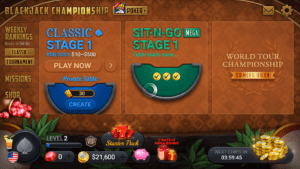
[example of the home screen where you can choose a public table and see all of you money/collected rewards including very fancy rubies which were much more challenging and exclusive to get]
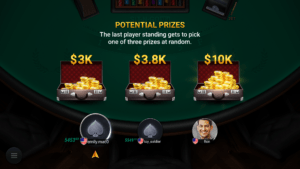
[a display of the money you could gamble to win at the end of the game if you beat the other players by having the most amount of chips after 5 rounds]
I particulary enjoyed Blackjack because unlike a lot of other chance games that I have played (e.g. War), I was given a false sense that I was being/could be strategic in the way that I played. I had zero control over what card would be drawn from the deck next for me and for the dealer, but I still felt like I was being strategic throughout the game and used “strategies” like deciding whether to “hit” or “stand” based on how low my combined card numbers were and the probability that I would draw a card that would tip me over 21 based on the cards that I saw already on the table. I also tried to “strategize” when to “hit” or “stand” based on the exposed card for the dealer and how well I felt it might help them get closer to 21 than me or bust. Blackjack also has built-in ways to make the game more complex like allowing a player to split their cards into multiple piles or double down on their bet, which also contributes to making you feel like you are strategizing as you play the game and makes you feel more like a “pro” who is getting the chance to make A LOT more money by playing in a more complicated, “advanced” way. This relates to Schull’s commentary in Addiction By Design in which players feel like their actions and timing have an impact on the outcome of their gambling when in reality, everything is already pre-determined for them and entirely dependant on chance. The illusion that chance is not the main driver is what keeps people engaged and coming back to try again, something that I definitely felt myself as I caught myself playing multiple rounds in order to try and “improve my skills.” This clearly makes the game feel like a challenge that gets people addicted and I also argue that it plays on the discovery and sensation types of fun because players discover new information and must make new decisions as they draw more and more cards and because the actual visual of seeing your chips pile up and double serves to make the game very satisfying. This was even more motivating when your rank was shown at the beginning of every game alongside that of your competitors, allowing you to compare how “good” or “successfull” you were in comparison to other people. There was also a leaderboard that you could access in the game lobby with a ranking of all of the best players in the game and how much money they had won, something that served as a motivator for me to keep playing because I wanted to win more and more money so that I could rise in my sub-par ranking.
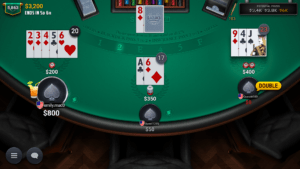
[example of a time when I pulled multiple extra cards and my opponent busted]
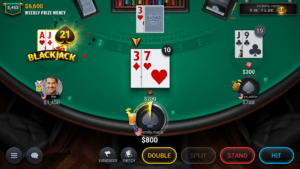
[example of all of the dsiplayed playing options]
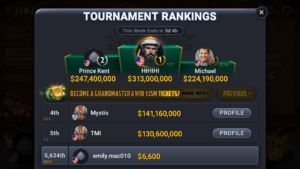
[example of the global rankings that you can compare yourself to]
I think that disguising randomness as skill is a clever way to make a game engaging as well as the fact that the game gave players daily free coins that they could claim so that they would be motivated to log onto the game at least once a day, but with gambling these design choices to maximize user engagement feel extremely predatory. I feel that I would not feel good as a designer using my HCI and probability knowledge to take advantage of people in such a terrible way. Blackjack Championships did not force players to bet money, everything was fake, but there was a built-in shop that players could go spend real money on for a chance to get more in-game money, with prices up to $99.99 USD. I think gambling games are a good lesson in the type of negative impact we as designers can have on our users with the design decisions we choose to make. Gambling is a very specific, malicious form of user engagement, but how might this also be present in other types of games we design?


